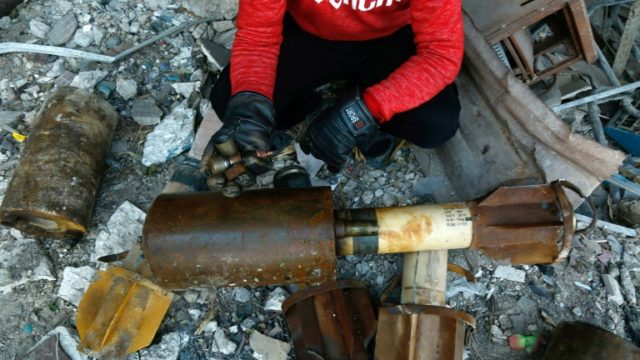The Hague (AFP) – Russia and Syria have stalled access to Douma by chemical weapons experts seeking to probe an alleged poison gas attack citing security concerns, diplomats said Monday, amid US fears that Moscow “may have tampered” with the site.
“The team has not yet deployed to Douma,” the head of the Organisation for the Prohibition of Chemical Weapons (OPCW), Ahmet Uzumcu, said at an emergency session in The Hague.
The closed-door talks at the global chemical watchdog’s headquarters came two days after a wave of punitive missile strikes by the US, Britain and France in Syria, in response to the alleged April 7 toxic arms attack on Douma.
The OPCW team had been expected to begin their fieldwork on Sunday, but they met with officials at their Damascus hotel instead.
Uzumcu said “Syrian and the Russian officials who participated in the preparatory meetings in Damascus” had informed the fact-finding mission “there were still pending security issues to be worked out before any deployment could take place”.
Evidence of chemical weapons can degrade quickly in the environment, and he urged the nine-member, all-volunteer team be allowed to deploy to Douma “as quickly as possible”.
– ‘Tampering’ with the site –
But the American ambassador to the OPCW claimed the Russians may have already visited the site.
“We are concerned they may have tampered with it with the intent of thwarting the efforts of the OPCW fact-finding mission,” said ambassador Ken Ward.
The Kremlin however dismissed the claims.
“I can guarantee that Russia has not tampered with the site,” Russian Foreign Minister Sergei Lavrov told the BBC.
A spokesman for President Vladimir Putin said the allegations were “groundless”, adding Moscow favoured “an impartial investigation”.
The missiles that US, French and British warships fired on suspected chemical facilities Saturday constituted the biggest Western attack against the regime in the seven-year war to topple Syrian President Bashar al-Assad.
The targeted sites were largely empty, and were all said to be facilities for chemical weapons storage or production.
– ‘Obscene lies’ –
In the Syrian capital, thousands of people gathered on the main Umayyad square to express their support for Assad in the wake of the missile strikes.
But at the OPCW, France urged nations to boost the organisation’s work so it can dismantle Syria’s “secret” toxic weapons programme.
“We all know, Syria has maintained a secret chemical programme since 2013,” French ambassador Philippe Lalliot said.
“The facts are there, and they defy the most obscene lies and the most absurd denials,” he said.
He added that priority must be given to helping the OPCW “complete the dismantling of the Syrian programme”.
And the United States called for a clear condemnation by the OPCW of “the Syrian government for its reign of chemical terror”.
The trio of Western powers that carried out the strikes warned they would repeat the operation if Damascus used chemical weapons again, while Putin warned any fresh strikes would “provoke chaos”.
Focus was however shifting to renewed diplomatic action, with a new resolution to be debated at the UN Security Council on Monday.
The attack on Douma, in which most experts say chlorine as well as an agent such as sarin were used, killed at least 40 people, according to local medics.
– Syria vows cooperation –
Holdout fighters from the Islamist group Jaish al-Islam subsequently surrendered their heavy weapons and left.
Regime forces have since entered Douma and declared the entire Eastern Ghouta region around it fully retaken, ending a five-year siege and reclaiming an opposition bastion on the edge of the capital.
Damascus and Moscow have vehemently denied that any chemical weapons were used in Douma and alleged instead that grim videos showing civilians foaming at the mouth after the attack were staged.
Syria’s Deputy Foreign Minister Faisal Mekdad said several coordination meetings were held with the OPCW team, but he did not provide any further details about their schedule.
“Syria reiterated its full readiness to coordinate and to facilitate the delegation’s work,” he said, quoted by the official state agency SANA.
But with all key players having anticipated its findings, the chemical arms watchdog faces a difficult task and there are fears the team may arrive too late on the ground.

COMMENTS
Please let us know if you're having issues with commenting.